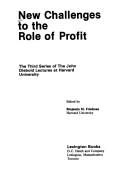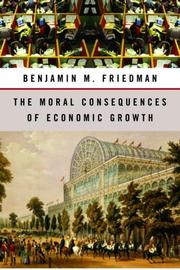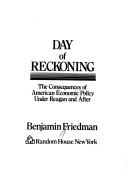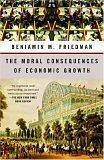| Listing 1 - 10 of 205 | << page >> |
Sort by
|

ISBN: 0669021717 9780669021714 Year: 1978 Publisher: Lexington, Mass. Lexington Books
Abstract | Keywords | Export | Availability | Bookmark
 Loading...
Loading...Choose an application
- Reference Manager
- EndNote
- RefWorks (Direct export to RefWorks)
Economic order --- Profit

ISBN: 0679448918 9780679448914 Year: 2005 Publisher: New York : Alfred A. Knopf,
Abstract | Keywords | Export | Availability | Bookmark
 Loading...
Loading...Choose an application
- Reference Manager
- EndNote
- RefWorks (Direct export to RefWorks)
From the author of 'Day of Reckoning', the acclaimed critique of Ronald Reagan's economic policy (& Every citizen should read it,& said 'The New York Times'): a persuasive, wide-ranging argument that broadly distributed economic growth provides benefits far beyond the material, creating and strengthening democratic institutions, establishing political stability, fostering tolerance, and enhancing opportunity. & Are we right,& Benjamin M. Friedman asks, & to care so much about economic growth as we clearly do?& To answer, Friedman reaches beyond economics. He examines the political and social histories of the large Western democracies& particularly of the United States since the Civil War& distinguishing times of generally rising living standards from those of pervasive stagnation to illustrate how rising incomes render a society more open and democratic. He shows, too, how our attitudes toward economic growth and its consequences have roots in the thinking of prior centuries, especially the Enlightenment, and also include significant strands of religious influence. Friedman also delineates the role of economic growth in determining which developing nations extend the broadest freedoms to their citizenry. He makes clear that growth, rather than just the level of living standards, is key to effecting political and social liberalization in the third world. But he also warns that the democratic values of countries even as wealthy as our own are at risk whenever incomes stagnate for extended periods. Merely being rich is no protection against a society's retreat into rigidity and intolerance once enough of its citizens lose the sense that they are getting ahead. Finally, Friedman shows us why, if America is to strengthen democratic institutions around the world as a bulwark against terrorism and social unrest, we must aggressively pursue growth at home and promote worldwide economic expansion beyond what purely market-driven forces would create. And for the United
Economic growth --- Professional ethics. Deontology --- Democracy --- Economic development --- Income distribution --- Political participation --- 174 --- 331.04 --- 338.8 --- AA / International- internationaal --- US / United States of America - USA - Verenigde Staten - Etats Unis --- 174.5 --- 330.35 --- 330.56 --- Self-government --- Political science --- Equality --- Representative government and representation --- Republics --- Citizen participation --- Community action --- Community involvement --- Community participation --- Involvement, Community --- Mass political behavior --- Participation, Citizen --- Participation, Community --- Participation, Political --- Political activity --- Political behavior --- Political rights --- Social participation --- Political activists --- Politics, Practical --- 330.56 Nationaal inkomen. Volksinkomen. Gezinsinkomen. Vermogensstratificatie. Particuliere inkomens en bestedingen. Armoede. Honger --- Nationaal inkomen. Volksinkomen. Gezinsinkomen. Vermogensstratificatie. Particuliere inkomens en bestedingen. Armoede. Honger --- 174.5 Economische ethiek. Speculatie --- Economische ethiek. Speculatie --- 330.35 Economische groei. Kwantitatieve toename. Technische vooruitgang --zie ook {338.09} --- Economische groei. Kwantitatieve toename. Technische vooruitgang --zie ook {338.09} --- Distribution of income --- Income inequality --- Inequality of income --- Distribution (Economic theory) --- Disposable income --- Moral and ethical aspects --- Langdurige bewegingen --- Economische groei --- Moral and religious aspects --- Democracy. --- Income distribution. --- Political participation. --- Moral and ethical aspects. --- Economic development - Moral and ethical aspects --- Développement économique --- Changement social --- Mondialisation --- Démocratie --- États-Unis --- Aspect moral --- Aspect environnemental --- Europe --- Politique économique

ISBN: 0394565533 9780394565538 Year: 1988 Publisher: New York Random House
Abstract | Keywords | Export | Availability | Bookmark
 Loading...
Loading...Choose an application
- Reference Manager
- EndNote
- RefWorks (Direct export to RefWorks)
Fiscal policy --- Debts, Public --- Loans, Foreign --- United States --- Economic conditions --- 330.48 --- 331.31 --- 333.846.0 --- 336.301 --- 336.311.2 --- 336.401 --- 336.61 --- US / United States of America - USA - Verenigde Staten - Etats Unis --- Foreign loans --- International loans --- Loans, International --- Loans --- Conditionality (International relations) --- Foreign loan insurance --- Neo-klassiekers en andere post-keynesiaanse theorieën. Public choice. Institutionalisten. Home economics. Analyseschool van de transactiekosten --- Economisch beleid --- Verband tussen het monetair, bank- en kredietbeleid en de economische ontwikkeling: algemeenheden --- Toestand, structuur, rentelast en evolutie van de rijksschuld --- Buitenlandse leningen van de overheid --- Verband tussen begrotingspolitiek en economische evolutie --- Financieel beleid --- Fiscal policy - United States. --- Debts, Public - United States. --- Loans, Foreign - United States. --- United States - Economic conditions - 1981 --- -Debts, Public
Book
ISBN: 9780593317983 059331798X 9780593317990 Year: 2021 Publisher: New York Alfred A. Knopf
Abstract | Keywords | Export | Availability | Bookmark
 Loading...
Loading...Choose an application
- Reference Manager
- EndNote
- RefWorks (Direct export to RefWorks)
"Where do our ideas about economics and economic policy come from? Critics of contemporary economics complain that belief in free markets, among economists and many ordinary citizens too, is a form of religion. It turns out that there is something to the idea: not in the way the critics mean, but in a deeper, more historically grounded sense. Contrary to the conventional historical view of economics as entirely a secular product of the Enlightenment, religion exerted a powerful influence from the outset. Benjamin M. Friedman demonstrates that the foundational transition in thinking about what we now call economics, beginning in the eighteenth century, was decisively shaped by the hotly contended lines of religious thought within the English-speaking Protestant world. Beliefs about God-given human character, about our destiny after this life, and about the purpose of our existence, were all under challenge in the world in which Adam Smith and his contemporaries lived. Those debates explain the puzzling behavior so many of our fellow citizens whose views about economic policies, and whose voting behavior too, seems sharply at odds with what would be to their own economic benefit. Understanding the origins of the relationship between religious thinking and economic thinking, together with its ongoing consequences, provides insights into our current economic policy debates and ways to shape more functional policies for all citizens"--
Economics --- Religious thought --- Capitalism --- Religion and capitalism --- Religion and economics --- Religious aspects --- History --- Sociology of religion --- Economic order --- E-books --- 241.65*5 --- 174.5 --- 241.67 --- 241.67 Business ethics. Corporate ethics. Bedrijfscodes. Management en ethiek. Zakenmoraal --- Business ethics. Corporate ethics. Bedrijfscodes. Management en ethiek. Zakenmoraal --- 174.5 Economische ethiek. Speculatie --- Economische ethiek. Speculatie --- 241.65*5 Theologische ethiek: private eigendom; diefstal; armoede --- Theologische ethiek: private eigendom; diefstal; armoede
Book
ISBN: 0593317998 Year: 2021 Publisher: New York, NY : Alfred A. Knopf,
Abstract | Keywords | Export | Availability | Bookmark
 Loading...
Loading...Choose an application
- Reference Manager
- EndNote
- RefWorks (Direct export to RefWorks)
"Where do our ideas about economics and economic policy come from? Critics of contemporary economics complain that belief in free markets, among economists and many ordinary citizens too, is a form of religion. It turns out that there is something to the idea: not in the way the critics mean, but in a deeper, more historically grounded sense. Contrary to the conventional historical view of economics as entirely a secular product of the Enlightenment, religion exerted a powerful influence from the outset. Benjamin M. Friedman demonstrates that the foundational transition in thinking about what we now call economics, beginning in the eighteenth century, was decisively shaped by the hotly contended lines of religious thought within the English-speaking Protestant world. Beliefs about God-given human character, about our destiny after this life, and about the purpose of our existence, were all under challenge in the world in which Adam Smith and his contemporaries lived. Those debates explain the puzzling behavior so many of our fellow citizens whose views about economic policies, and whose voting behavior too, seems sharply at odds with what would be to their own economic benefit. Understanding the origins of the relationship between religious thinking and economic thinking, together with its ongoing consequences, provides insights into our current economic policy debates and ways to shape more functional policies for all citizens"--
Economics--Religious aspects. --- Economics --- Religious thought --- Capitalism --- Religious aspects. --- History.

ISBN: 9781400095711 1400095719 Year: 2005 Publisher: New York : Vintage Books,
Abstract | Keywords | Export | Availability | Bookmark
 Loading...
Loading...Choose an application
- Reference Manager
- EndNote
- RefWorks (Direct export to RefWorks)
Economic development --- Income distribution. --- Political participation. --- Democracy. --- Développement économique --- Revenu --- Participation politique --- Démocratie --- Moral and ethical aspects. --- Aspect moral --- Répartition
Book
Year: 1975
Abstract | Keywords | Export | Availability | Bookmark
 Loading...
Loading...Choose an application
- Reference Manager
- EndNote
- RefWorks (Direct export to RefWorks)
Book
Year: 2010 Publisher: Cambridge, Mass. National Bureau of Economic Research
Abstract | Keywords | Export | Availability | Bookmark
 Loading...
Loading...Choose an application
- Reference Manager
- EndNote
- RefWorks (Direct export to RefWorks)
Book
Year: 2006 Publisher: Cambridge, Mass. National Bureau of Economic Research
Abstract | Keywords | Export | Availability | Bookmark
 Loading...
Loading...Choose an application
- Reference Manager
- EndNote
- RefWorks (Direct export to RefWorks)
Book
Year: 2005 Publisher: Cambridge, Mass. National Bureau of Economic Research
Abstract | Keywords | Export | Availability | Bookmark
 Loading...
Loading...Choose an application
- Reference Manager
- EndNote
- RefWorks (Direct export to RefWorks)
| Listing 1 - 10 of 205 | << page >> |
Sort by
|

 Search
Search Feedback
Feedback About
About Help
Help News
News